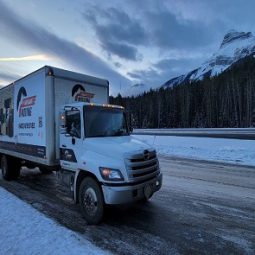Are Moving expenses tax deductible?

Whether it’s end-of-year preparations or close to tax-time, we may find ourselves asking the hard questions about our way of life, and taxes is one of them. More specifically, the question: “Are moving expenses deductible?”
So…what is the answer?
As with many things, there is no definitive “yes” or “no,” but an answer that is more like, “It depends…”. According to current information, it is possible to claim your moving expenses…if…you have moved closer to your place of employment…with this extra bit of “fine print”: your new home must be at least 40 kilometres closer to your place of work than your prior location. Moving from High River to the Belt Line to be closer to your downtown Stephen Avenue Mall office? That’s great. You’ve got a tax-deductible move you can claim. Moving from High River to Okotoks to be closer to that Stephen Avenue Mall office? No deduction…it’s less than 40 kilometres.
Knowing this, however, we suggest you base any decisions on whether this move helps you enjoy a better quality of life. If the move leaves you dissatisfied, a sizable tax deduction will have little effect on improving your new, but worse, way of life.
Types of the tax-return moving expenses
When you look at the distance you need to travel and see that you qualify to claim moving expenses, there are many more things you can claim against your income.
Tax-return moving expenses include the following:
- transportation costs: the mileage you put on your car
- the cost of hiring movers to transport your belongings to your new address,
- packing expenses
- insurance
- storage costs.
- personal expenses connected to the move:
- rental accommodations (hotel or motel), usually up to a maximum of 25 days
- any additional vehicle expenses incurred (always check to see what is considered “deductible”).
What about other things related to the move?
At present, there are a number of expenses you can claim that are “incidental” to your move:
- changing addresses on any legal documents
- replacing your driver’s licences and vehicle permits
- any utility hookups or disconnection fees incurred.
- any expenses incurred when:
- cancelling the lease of your old residence
- you needed to maintain your former residence while it was unoccupied after your move (up to a maximum of $5,000)
- any expenses incurred:
- if you had to buy or sell the property as part of the move
- deduct the selling costs such as legal fees, real estate commissions, mortgage penalties, and any advertising costs
Methods of calculating CRA moving expenses
If you were put in a position in 2022 where it was necessary to move 40 kilometres or closer to work, there are several deductions you can claim to lighten the financial burden. There is no limit on how much you can deduct for the expenses we listed above. However, you need to be clear about the actual costs incurred. Be careful to keep and organize all your receipts.
There are two methods the CRA outlines that you can use to calculate your meal and vehicle expenses: the detailed method or the simplified method. With the detailed method, make sure to keep all your receipts, total the various amounts, and claim the exact amounts that you spent on meals and mileage. For mileage record-keeping, we suggest you keep a driver’s log listing out dates. times, the number of kilometres travelled, and subsequent fuel costs.
With the simplified method, the CRA recommends the following procedures. For meal expenses, simply claim a flat rate per person. Although you do not need to keep itemized and detailed receipts, the CRA may still ask you to provide some proof of expenses. When claiming vehicle expenses, simply multiply the number of kilometres by the cents/km rate relative to the province or territory where your move began.
When and how can you claim moving expenses in Canada?
Our answer to that question is…now.
In 2023, the personal income tax filing deadline is May 1, 2023 and June 15, 2023, for self-employed individuals. The deadlines are strict, so if you fail to file your tax return in time, you may be faced with a variety of expensive interest payments, fees, and penalties.
Even when it comes to your move to act promptly, we suggest the same thing for your claims for moving expenses. If you are prompt, well-prepared, and methodical, we believe you will be rewarded with a much smoother and less stress-free tax season.
To give you even greater confidence about your choice to claim moving expenses, consider hiring a professional accountant. Accountants know better than anyone how to claim moving expenses in Canada. If you’re confident to prepare your tax returns yourself, you can do it on line 21900, according to the CRA, on your income tax form.
Whatever approach you choose, remember that the best and most stress-free way to manage your next move is to hire the experienced professionals at Paramount Moving and get the help you deserve.
 (403) 371 6578
(403) 371 6578









